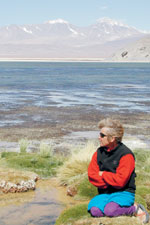| |
September 29, 2004
A National Public Radio Commentary
April 7, 2004 Margaret Erhart, novelist from Flagstaff, Ariz., conducted her own research on single-sex schools.  When I came into the fifth grade classroom to teach writing, it wasn’t long before I noticed the girls had nothing to say. Not that they couldn’t fill a page if I asked for one, or follow an assignment. They could follow anywhere, and write anything, as long as it had nothing to do with them. When I came into the fifth grade classroom to teach writing, it wasn’t long before I noticed the girls had nothing to say. Not that they couldn’t fill a page if I asked for one, or follow an assignment. They could follow anywhere, and write anything, as long as it had nothing to do with them.
The boys were like little James Deans. They wrote about sports cars and spaceships. Their heroes were aliens. At every opportunity they challenged the rules of writing, eager to break them and come up with their own.
The girls used the word “nice” a lot. They wrote descriptions of rainbows and flowers. Their questions included the words “supposed to,” and their statements began with “I can’t.” The more I stressed creativity and non-compliance, their own smart thoughts and ideas, the less they wrote.
When I was their age, I went to a girls’ school. I didn’t worry about what boys thought of me, or if they thought of me. The two things I trusted were my imagination and my intelligence. I was expected to be smart and independent. It was a great gift.
| | "When I was their age, I
went to a girl's school. I
didn't worry about what
boys thought of me, or if
they thought of me. The
two things I trusted were
my imagination and my
intelligence. I was
expected to be smart and
independent. It was a
gift." | | Now I wanted to give these girls and boys a chance to try something different, to be someone different if they wished. Their classroom teachers agreed, and our experiment in single-sex education began.
My students were surprised at the new arrangement. But within a day or two the girls came out from behind their hair to discover that stories and poems were a secret way to write about themselves. For the first time, they played with language and imagery. “I’m the victim who wears colorful shoes,” wrote Cassie. And Dominique confessed: “I feel as condemned as a net of evil shovels.”
The boys stopped hiding behind aliens and machines, finding their own sincere voices. Kim wrote: “He stands alone, walking up and down in his new sneakers, so young to experience the truth, the candy held so tightly it’s melting. She prances by, head high. You can almost hear the glass shattering.”
I no longer had trouble getting my young writers to read their work aloud. The usually shy Melanie jumped to her feet and sang out: “I will not let anyone rest on me. Who is brave enough to try? Only the smallest, most innocent birds, the bees armed with stingers sharp and frightened as my own.”
I was astonished at their honesty, at the feeling that came out in their poems and stories. I wondered if it made a difference, separating the sexes, or whether we would have gotten to that strong writing eventually, given enough time. Alex, the only boy who seemed to have little to say, gave me this poem the day I left: “I feel like a light looking out at the world. I feel surprised. I see all but know very little. I feel like a line straight and sturdy, yet weak and feeble. I feel dark, powerful and amazing.”
Margaret Erhart is an educator, writer, and novelist who lives in Flagstaff, Arizona. She is the author of Old Love and other novels. Her newest work, Crossing Bully Creek, will be published in 2005 by Milkweed Productions.
Contact her at: merhart@flagstaff.az.us
|